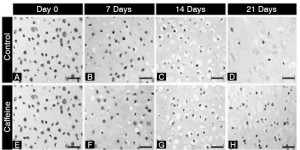 This idea that coffee and caffeine stunts one’s growth has been a very prevalent “myth” that has been going around for at least as long as I have been around. I heard about this idea floating around my school even when I was in grade school and my mother would tell me not to drink coffee because she was worried that I would stunt my growth. I guess she believed it because she had had heard about this myth from when she was younger and in school too. Those long nights of studying and writing papers in High School and College was always accompanied with large pots of coffee and during that time, we probably didn’t or think about our growth being stunted when we were in so much pressure to reach academic success.
This idea that coffee and caffeine stunts one’s growth has been a very prevalent “myth” that has been going around for at least as long as I have been around. I heard about this idea floating around my school even when I was in grade school and my mother would tell me not to drink coffee because she was worried that I would stunt my growth. I guess she believed it because she had had heard about this myth from when she was younger and in school too. Those long nights of studying and writing papers in High School and College was always accompanied with large pots of coffee and during that time, we probably didn’t or think about our growth being stunted when we were in so much pressure to reach academic success.
Coincidently, I am drinking a cup of Non-fat americano as I am writing this, which I have not had in years. It just so happened that the the person who took my order got it wrong when I actually ordered a fruit smoothie (don’t judge me, I like my fruit!) and I decided to not return it to be nice.
So does drinking a lot of coffee stunt one’s growth? From the studies done, that is NOT TRUE. From the resources I have found, all of them say the same thing, which is that it was originally believed that coffee would lead to increased risk of osteoporosis and loss of bone mass. That was proved to be not true.
Resource #1: MSNBC
Research suggests that coffee consumption has no effect on height. This myth was started decades ago when it was thought that caffeine in coffee may be a risk factor for osteoporosis, and subsequently lead to reduced bone mass. However, much of the previous research that linked caffeinated beverages and osteoporosis were made in populations that also had low calcium intakes. These people were more likely replacing calcium-rich milk with coffee or caffeinated sodas. Low calcium intakes are clearly linked to reduced bone health.
More recent studies suggest that even if caffeine does offset calcium absorption, the effect is both slight and easily offset by adding some milk in your coffee. Of course, you’ll also need an appropriate daily dose of calcium throughout the day from low-fat dairy, fortified foods, certain greens and/or supplements.
Resource #2: New York Times
he only problem, it seems, is that after decades of research on the physiological results of coffee consumption, there is no evidence that it has any effect on height.
How this myth got started is unclear. But scientists believe it has something to do with caffeine, which for many years was thought to be a risk factor for osteoporosis. That concern stemmed from early studies that associated high intake of caffeinated beverages with reduced bone mass.
More recent studies suggest that if there is such an effect, it is both slight and easily offset when dietary intake of calcium is adequate.
There is also another explanation for the association. According to a study by Dr. Robert P. Heaney, a calcium expert at Creighton University in Omaha, much of the research linking caffeine consumption to reduced bone mass was conducted on elderly people whose diets were low on milk and other sources of calcium – largely because they drank so much caffeine-laden coffee and soda instead.
Another study tracked 81 adolescents for six years and found that those who had the highest daily caffeine intake had no difference in bone gain or bone density at the end of the study than those with the lowest.
THE BOTTOM LINE The research suggests that coffee will not stunt growth.
Resource #3: TLC: How Stuff Works
….but most experts agree that it has something to do with an early study linking caffeine to reduced bone mass and osteoporosis. Those studies, however, were conducted on elderly people whose diets were lacking in calcium, which could easily have explained the loss of bone mass.
Subsequent studies showed that women aged 65 to 77 who drank about 18 ounces of caffeine daily did have greater bone loss over a three-year period than those who didn’t. But the effects occurred only in women with unusual variations in their vitamin D cell receptors — and were completely mitigated if the women ingested the recommended daily allowance of 1,200 mg of calcium a day.
Focusing exclusively on children, a more recent study tracked 81 teenagers for six years. The result? There was no difference in bone density between the biggest buzz catchers and those who drank the least amount of caffeine
Resource #4: Baby Center
No. Caffeine has plenty of undesirable effects, but interfering with a child’s growth isn’t one of them.
As any adult who relies on a morning cup of coffee or tea can tell you, caffeine is a stimulant. It might make a child irritable, upset her tummy, make her heart beat faster, raise her blood pressure, and disrupt her sleep, but it won’t keep her from growing.
Of course, inadequate nutrition can slow a child’s growth. And caffeinated beverages such as sodas are empty calories, contributing no nutrition while filling her up. This is another good reason to keep your child’s caffeine intake to a minimum.
You might be surprised to discover how much caffeine is in various drinks and foods:
Caffeinated soft drinks (12 ounces): 34 to 72 mg (check the label)
- Energy drinks (8 ounces): 76 to 280 mg
- Iced tea (12 ounces): about 70 mg
- Milk chocolate (2 ounces): 12 mg
- Dark chocolate (2 ounces): 40 mg
- Chocolate milk (8 ounces): 5 mg
Tyler’s Notes:
Here’s my research on coffee and the latest study I found regarding coffee and growth:
In vitro effects of caffeine in growth cartilage of rats.
“THE CARTILAGINOUS EPIPHYSES OF FEMURS OF NEWBORN RATS, WHICH WERE DIVIDED INTO TWO SUBGROUPS: treated with caffeine and control group, both observed over the time periods of 0, 7, 14 and 21 days. The cartilaginous epiphyses of femurs of each subgroup and each time span were subjected to histomorphometric, immunohistochemical analysis, Tunel technique and RT-PCR in real time.
The decrease in proliferative activity and the increase of apoptotic chondroblasts at 21 days were found regardless of the subgroup. However, the decrease in cell proliferation caused by caffeine was lower than in the control group and significantly increased the expression of gene transcripts for chondrogenic differentiation, represented by Sox-9 and Runx-2. However, the in vitro culture with caffeine revealed antagonistic effects: despite the positive effect on chondroblasts proliferation and differentiation, caffeine increased apoptosis, characterized by increased expression of caspase 3 and of the number of cells undergoing apoptosis.{Increased apoptosis is not necessarily bad for height growth}
Caffeine presents antagonistic effects in vitro on growth cartilage, increasing the proliferation, differentiation and cell apoptosis.”
“The percentage of empty chondroblasts lacunae in the cartilaginous epiphysis of the femur significantly increased over the growth period. However, the percentage of chondroblasts gaps with pyknotic nuclei increased on day seven, remaining so until the 21th days compared to day zero. However, at 21 growth days, the group treated with caffeine showed a number of empty lacunae of chondroblasts significantly lower compared to the control group.”
Here’s a comparison of control and caffeine chondrocytes per lacunae:
Sox9 levels were almost 4 times higher in the caffeine group than the control group.


My research states that caffeine reduces intracellular calcium secretions which is bad if you’re trying to reinduce chondrocyte differentiation but should only slow down growth in growing individuals.
Pingback: Introduction To Dwarfism, Achondroplasia, And Growth-Hormone Deficiency - |
Pingback: Complete List Of Posts - |
Pingback: Does Smoking Really Cause Stunted Growth And Shorter Height? - Natural Height Growth | Natural Height Growth
Pingback: Calcium Enriched Foods Like Milk Do Seem To Make Young Kids Taller | Natural Height Growth